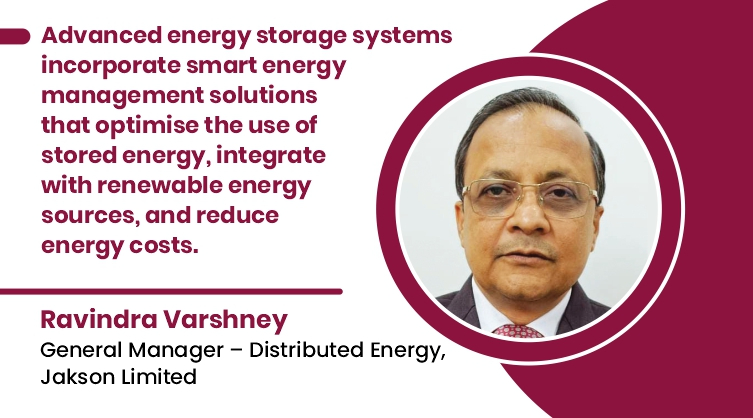Energy storage technology is evolving to meet the growing energy demand
By EPR Magazine Editorial November 2, 2023 6:04 pm IST
By EPR Magazine Editorial November 2, 2023 6:04 pm IST

Advanced energy storage systems incorporate smart energy management solutions that optimise the use of stored energy, integrate with renewable energy sources, and reduce energy costs.
Changes in energy storage technology
Energy storage tech drives renewables transition, tackling intermittent generation and enhancing sustainability. Advancements include efficient lithium-ion batteries, scalability, smart management, rapid charging, and eco-friendly practices. These changes ensure stable, reliable energy from intermittent sources like solar and wind, aid the shift to cleaner energy, reduce emissions, and boost efficiency across sectors. Essentially, they promise a greener, more reliable, and efficient energy future.
Grid reliability
Energy storage is crucial for grid reliability, especially with intermittent renewables and extreme weather. It helps smooth the power supply by storing excess energy from peak renewable production and releasing it when generation is low, ensuring a steady supply. It enhances grid stability, responding quickly to demand fluctuations to prevent blackouts. Additionally, it serves as emergency backup power during crises. Lastly, it aids in seamlessly integrating renewables by absorbing and releasing surplus energy, maximising their contribution. Overall, energy storage boosts grid reliability, addresses renewables’ intermittency, and ensures a stable and resilient energy infrastructure.
Sustainability goals
Energy storage is pivotal for sustainability in several ways. Firstly, it reduces emissions by enabling renewable energy use, lowering reliance on fossil fuels, and contributing to carbon emission reductions and cleaner air. Secondly, energy storage boosts overall energy efficiency by storing excess energy during low-demand periods and releasing it during high-demand times, minimising waste and optimising resource use.
Furthermore, the industry is adopting sustainable practices, emphasising eco-friendly materials and recycling to reduce environmental impact. Additionally, governments and organisations establish energy efficiency standards, ensuring alignment with sustainability goals and promoting reliability.
Energy storage has eco-friendly applications, powering remote areas with renewables and reducing diesel generator reliance in sensitive environments, showcasing its versatility in advancing sustainability.
Storage costs affecting industries and economiesThe declining energy storage costs have significant implications for industries and economies. Firstly, they make renewable energy more economically competitive, driving investments in clean energy technologies and facilitating the transition to sustainable energy solutions. Industries requiring reliable power, such as data centres, manufacturing, and healthcare, benefit from cost-effective energy storage, ensuring uninterrupted operations, reducing costs, and promoting growth.
Additionally, the expanding energy storage sector creates jobs in manufacturing, installation, maintenance, and R&D, bolstering local and national economies while fostering expertise in energy storage technologies.
Moreover, lower storage costs drive wider adoption in residential and commercial applications, enhancing accessibility and fueling innovation in the energy storage industry. In summary, decreasing storage costs is pivotal in reshaping industries, strengthening economies, and advancing the global transition to sustainable and cost-effective energy solutions.
Government policies for the industry
Government initiatives are essential for advancing energy storage. They offer incentives like tax credits, grants, PLI schemes, and subsidies to make these technologies accessible and encourage adoption. Regulations and standards ensure safety, efficiency, and sustainability in energy storage systems, protecting users and the environment. Government-funded R&D programs drive innovation, allocating resources to support projects that advance energy storage, benefiting industries and society. These efforts collectively nurture the growth, safety, and improvement of energy storage technologies.
Investments in storage area
In India, energy storage investments are increasing to meet intermittent energy demand. The government supports Battery Energy Storage Systems (BESS) with 4,000 MWH capacity through Viability Gap Funding, bridging gaps and promoting deployment. Private companies invest in energy storage to meet growing power needs. Research institutions work on efficient, cost-effective, India-specific storage solutions. These investments ensure a stable energy supply, integrate renewables and meet sustainability goals amid intermittent demand challenges.
Spokesperson: Mr. Ravindra Varshney,General Manager – Distributed Energy,Jakson Limited
We use cookies to personalize your experience. By continuing to visit this website you agree to our Terms & Conditions, Privacy Policy and Cookie Policy.